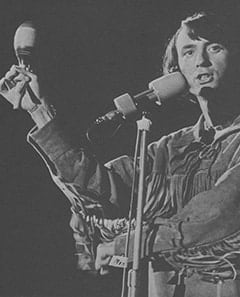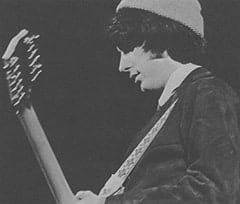
…as club owner Doug Weston remembers them
(It’s impossible to miss Doug Weston in a crowd. For a start, he’s over seven feet tall and wears a Beatle haircut! But more important, Doug owns the Troubadour, a famous folk club in Los Angeles which has launched people like the Smothers Brothers and Roger Miller, as well as rock groups like the Sunshine Company and Nitty Gritty Dirt Band. And a very special person is also an alumnus of Doug Weston’s Troubadour—none other than Monkee Mike Nesmith!)
I first met Mike about three years ago when he came to my club, the Troubadour, and auditioned for me. He was trying to get into a blues bag at the time doing sort of a slick R & B act for the “better” nightclubs. But this didn’t work out too well for him and he went out on tour with some rock and roll show.
The second time I met Mike was right after he had decided he wasn’t happy with what he was doing and had joined one of Randy Sparks’ groups. Finally he decided he wasn’t happy with that either.
But I really got to know Mike when I hired him as my hootmaster for the Monday night hootenannies at the club, a job he held for almost two years.
Mike’s talents Permalink
And from the first time I ever saw Mike on a stage, I respected his talents. I could see right away that he was a bright young man and he has a wit, a nice country wit.
Mike did a very good job as hootmaster. He had spontaneous humor and a light way of introducing the performers. It’s an involved job, too, and Mike had to take care of scheduling the acts, handling the performers, and plan a show as well. And he did the job nicely.
Finally Screen Gems came to see Mike and they were equally impressed with his talents. They had called me for prospective talent for The Monkees and Mike was one of the many people I referred to them. By this time, both Mike and Peter were being seriously discussed for the parts.
Don’t think I mean to say that I got them the gig. Nothing could be farther from the truth—they got the parts on their own talent. I just suggested Mike, and if I’m not mistaken, I think Mike is the one who sent Peter down to audition.
Folk bag Permalink

A lot of people now involved with The Monkees, like Mike, Peter and their producer, Chip Douglas, basically hung out at the Troubadour. It’s a folk club and we have hootenannies but we also have all kinds of music. And remember that both Mike and Peter came out of the folk bag.
Mike helped develop a lot of people while he worked as hootmaster at the Troubadour. You see, he had control over scheduling—who would go on when—and he could arrange certain people to be on at the best times.
Occasionally Mike himself could get on stage and play. He had already put several discs out under the name Mike Blessing, though I don’t know where the Blessing came from because he was using Mike Nesmith at the time and he was always talked of as Mike Nesmith.
Peter likewise played the Troubadour (all this was happening for the guys just when their careers were ready to break). He was working at the time as a dishwasher at the Golden Bear in Huntington Beach and he came up one night to audition. He seemed quite charming and I could tell that he really had something going for him but that he was still trying to get himself together. He played the Troubadour for several weeks and then he was asked to audition for The Monkees.
Big audition Permalink
After the audition, Peter went off to New York to wait until Screen Gems announced the results. Mike found out he’d been chosen for The Monkees and then I think Mike realized Peter would be called back from New York for the part. Peter returned and the filming started. Peter continued to play the Troubadour for three or four months but then his filming schedule just got too heavy and he had to quit. But he and Mike still come back and perform once in awhile.
It’s interesting to see the difference in audience reaction before and after The Monkees. Before, Mike and Peter would get moderate to good response. Now when they play the audience just goes wild! And Mike particularly has retained some of the special stage humor which set him off before the series began.
Now as I look back on Mike’s Troubadour days, I can remember some really funny incidents that happened and the great way he had of handling them.
For instance, we were always bugged by promotion people who would try influence to get their client on first instead of using our first come, first served method. Mike had a good way of taking care of these people without alienating them, even though they were the kind who were basically just trying to con their way into the hoot rather than wait their turn.
Clever Mike Permalink

When something like this happened, he’d come strolling over to me with the troublesome person in tow and I could tell by the glint in his eyes what he was up to. He’d say, “Gee, we really have a difficult problem here,” in mock seriousness. You see, he was playing a game with the other person and he’d already communicated to me just by the look in his eyes that here was a person trying to use favoritism.
Then he’d go through a long story, telling me how difficult it was to help this person out and he’d go on and on and I’d nod in agreement. But actually, I knew Mike was going to work it out his own way and the performer would play in the same spot Mike had originally assigned him, despite what his promotion man tried to do. But don’t misunderstand, Mike always handled people very fairly—he’s an extremely fair-minded person.
Stocking cap Permalink
Mike was quite a spectacle in those days, too. He wore his stocking cap all the time and, of course, levis and colorful shirts. He’d do a set every once in awhile and I think he did an occasional gig at other clubs, too. Meanwhile, he worked on recording sessions and I know he did a lot of songwriting.
Looking back now, I think there is something people who want to get into show business could learn from Mike (and Peter’s) Troubadour days.
Mike realized that success is hardly ever instantaneous. It takes serious work. Mike wasn’t just a performer waiting around to be discovered on the streets. He took an active role in his career. He performed every occasion he could. He was seriously trying to break through.
Mike didn’t just come out of the woods. He didn’t fall into a Cinderella thing. He knew that success is a matter of being in the right place at the right time, and being there frequently!

